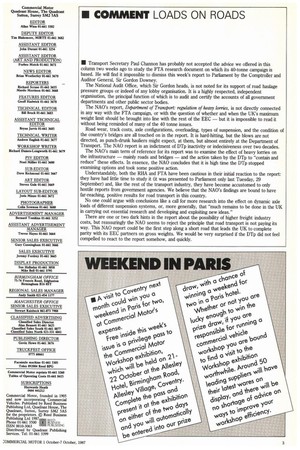• COMMENT LOADS ON ROADS
Page 5

If you've noticed an error in this article please click here to report it so we can fix it.
• Transport Secretary Paul Channon has probably not accepted the advice we offered in this column two weeks ago to study the FTA research document on which its 40-tonne campaign is based. He will find it impossible to dismiss this week's report to Parliament by the Comptroller and Auditor General, Sir Gordon Downey.
The National Audit Office, which Sir Gordon heads, is not noted for its support of road haulage pressure groups or indeed of any lobby organisation. It is a highly respected, independent organisation, the principal function of which is to audit and certify the accounts of all government departments and other public sector bodies.
The NAO's report, Department of Transport: regulation of heavy lorries, is not directly connected in any way with the FTA campaign, or with the question of whether and when the UK's maximum weight limit should be brought into line with the rest of the EEC — but it is impossible to read it without being reminded of many of the 40 tonne issues.
Road wear, track costs, axle configurations, overloading, types of suspension, and the condition of the country's bridges are all touched on in the report. It is hard-hitting, but the blows are not directed, as punch-drunk hauliers might expect, at them, but almost entirely at the Department of Transport. The NAO report is an indictment of DTp inactivity or indecisiveness over two decades.
The NAO's main term of reference for its report was to examine the effect of heavy lorries on the infrastructure — mainly roads and bridges — and the action taken by the DTp to "contain and reduce" these effects. In essence, the NAO concludes that it is high time the DTp stopped examining options and took some positive action.
Understandably, both the RI-IA and FTA have been cautious in their initial reaction to the report: they have had little time to study it (it was presented to Parliament only last Tuesday, 29 September) and, like the rest of the transport industry, they have become accustomed to only hostile reports from government agencies. We believe that the NAO's findings are bound to have far-reaching, positive results for road transport in this country.
No one could argue with conclusions like a call for more research into the effect on dynamic axle loads of different suspension systems, or, more generally, that "much remains to be done in the UK in carrying out essential research and developing and exploiting new ideas."
There are one or two dark hints in the report about the possibility of higher freight industry costs, but reassuringly the NAO seems to reject the principle that road transport is not paying its way. This NAO report could be the first step along a short road that leads the UK to complete parity with its EEC partners on gross weights. We would be very surprised if the DTp did not feel compelled to react to the report somehow, and quickly.












































































































